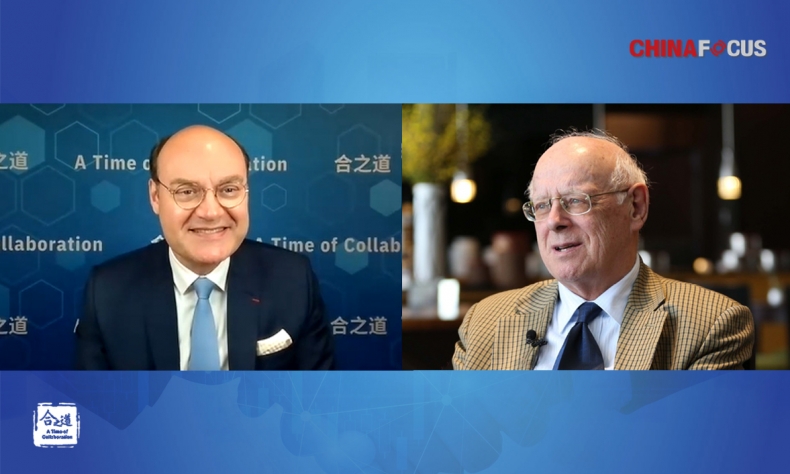
Cooperation as the Essence of Diplomacy
If the United States, China, Europe are able to reach a consensus on a new world order in which we can live, compete, cooperate together, the 21st century will be a safe one and will be a prosperous one.
Editor’s Note: The Biden administration seeks to draw the European Union to its side to contain China, which could lead to the dangerous rivalry between powers. What’s the best way for the United States, China and EU to deal with their relations? David Gosset, the founder of Europe-China Forum, discussed with Eugenio Bregolat who is a former diplomat, having served an unprecedented three times as Spanish Ambassador to China (1987-1991, 1999-2003, 2011-2013). He also served as Ambassador to Russia, Canada, Andorra and Indonesia.
A Time of Collaboration, hosted by Mr. Gosset, is a high-level dialogue with international veteran diplomats, business elites and outstanding scholars. The serial interviews are presented by China Focus in association with DG2CI Limited.
David Gosset: Mr. Ambassador, you are an outstanding diplomat. Would you say that diplomacy is the art of forging cooperation?
Eugenio Bregolat: Well, diplomacy is defined as the promotion of national interest by peaceful means. Of course, cooperation, collaboration is of the essence. Interests among states sometimes coincide, say the fight against global challenges. No problem, then we coincide. But very often, interests among the states do not coincide. They have conflicting interests. And the diplomats have to strive to find common ground, to strike a balance between the interests of the one side and the interests of the others, so that we can accommodate each other. I believe that the main principles of my business very shortly are one, empathy.
You have to try to understand the real interests of the other side. You have to make sure that the other side understand the real interests of your side. This, I’d say, is number one. Then, second thing would be, I believe, trust. Trust and credibility are achieved by always saying the truth. Maybe you don’t say the whole truth, but you never lie to the other side. You always say the truth. Never try to outwit the other side, to play tricks with the other side.
David Gosset: Thank you very much, Mr. Ambassador, and also for mentioning the very important notion of empathy. I think, empathy, this is a very powerful concept. Now, nobody knows as you know the relationship between Spain and China. Do you think we should do more, or what could be done in order to increase the level of understanding about China in your country, Spain?
Eugenio Bregolat: In Spain, the degree of knowledge and understanding of China is still too low in general. And the information received about China sometimes is biased, it’s not always objective information. As the relationship grows, more Spanish students in China, more Chinese students in Spain, more businessmen, more tourists, moving in both directions.
Knowledge and understanding are increasing in both sides. The labor of some institutions, like, let’s say, Cervantes Institute in China, Confucius Institute in Spain. So okay, let’s say that in a spontaneous and natural way, knowledge is increasing because China is already so big and so important, and the relationship each passing year is becoming closer.
David Gosset: Thank you very much. A last question, when you think about the relationship between Spain and China, where do you think things could be improved, in which area you would like to see the deepening of Sino-Spanish cooperation?
Eugenio Bregolat: I believe that, in fact, we cannot talk anymore about the relationship between Spain and China without taking into account Europe. As Jean Monnet said, European countries, one by one are too small to compete with the United States, China. And if we are not able to unite politically, said Monnet, the alternative to a political union is growing irrelevance. One by one, we are too small. This is a fact of life, it’s like that.
Of course, we have a different political system, a different economic system. We have to be respectful for the other side. Otherwise, relations will get into, it will be impossible to proceed.
Finally, the 21st century will be mostly and is being already mostly about the accommodation of China into the international system. Of course, it will be also the accommodation of Europe. If Europe is able to move towards a political union, speak with one voice, act with one will, then if the United States, China, Europe are able to reach a consensus on a new world order in which we can live, compete, cooperate together, the 21st century will be a safe one and will be a prosperous one. If we fail on that in a world full of atomic weapons, this may be really, this time, in truth, this may be really the end of history.
David Gosset: Thank you very much, Mr. Ambassador. And I would like also to thank you, and I refer to our discussion on the art of diplomacy, for what you have been doing as an outstanding diplomat for peace and shared prosperity at the global level. Thank you very much.
Eugenio Bregolat: Thank you, David.
 Facebook
Facebook
 Twitter
Twitter
 Linkedin
Linkedin
 Google +
Google +










